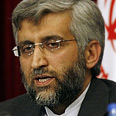
Saeed Jalili
Photo: AP
Iran's chief nuclear negotiator said on Thursday he will hold talks with the European Union foreign policy chief on Nov. 30 over the country's atomic work, which the West fears is a cover to build an atomic bomb.
The outcome of such a meeting between Iran's Saeed Jalili and the EU's Javier Solana could help determine whether Iran will face new sanctions over its nuclear program.
"Yes, our talks with Mr. Solana will be in London on November 30," Saeed Jalili told reporters on the sidelines of a conference called "Iran's nuclear program and ElBaradei's report".
The United States accuses Iran of seeking to build atomic bombs and says that if it succeeds it could threaten world peace. Iran says its nuclear program is peaceful and designed for electricity generation. It has consistently refused to heed UN demands to halt its nuclear work.
Solana is due to report on Iran's readiness or otherwise to suspend uranium enrichment and enter into negotiations on its nuclear program before major powers take a decision on whether to impose further punitive measures on the Islamic Republic.
Washington pushing for more UN measures
A meeting of governors at the UN's International Atomic Energy Agency (IAEA) is set to consider on Thursday and Friday an Iranian plan to offer more transparency in its nuclear activities. The IAEA's chief, Mohamed ElBaradei, is expected to urge backing for the plan.
The United Nations Security Council has passed two mild sanctions resolutions against Tehran since last December. Washington is now pushing for more UN measures but Russia and China have so far been reluctant.
On Wednesday Javad Vaeedi, Jalili's deputy, said he had agreed the Nov. 30 meeting in a telephone conversation with a Solana aide. Solana's spokeswoman had earlier denied another Iranian report, citing an unnamed source, they were scheduled to meet on Nov. 26.
Washington says it is committed to finding a diplomatic solution to the nuclear row, but has not ruled out military action if that fails.
Iran, the world's fourth-largest oil producer, says it wants nuclear-generated electricity in order to free up more oil for export.















